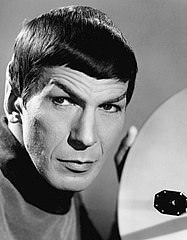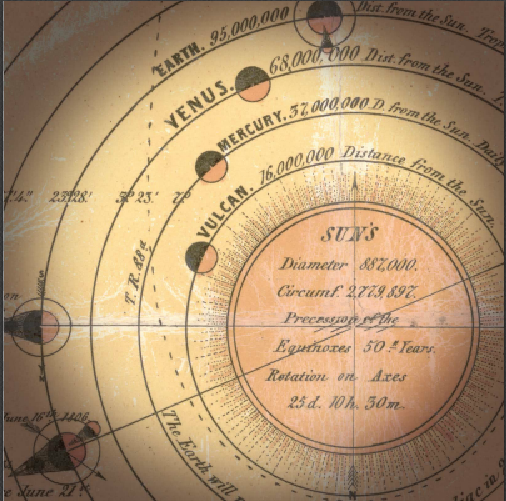How Did Mr. Spock Come to be from the Planet Vulcan? (The Ultimate Star Trek Trivia Question)
While virtually everyone in the western world has heard of Star Trek and its extradorinarily logical half Vulcan Mr. Spock, how many know why he is a Vulcan from the planet Vulcan, and not from some other planet? In this case, instead of science adopting science fiction, science fiction adopted science... well, it was almost science.

Image Credit: Wikimedia Commons
What Does Gravity Have to Do With Mr. Spock?
The story of the planet Vulcan starts all the way back in the 1600's with Newton's 'discovery' of gravity and the subsequent attempts to not only confirm this theory of gravity, but to confirm it with the best possible science: predictability.
Astronomers were able to study the orbits of the planets using the new formula of gravity, and when they did, began to see some planets orbiting in patterns that departed from the orbits predicted by Newton's formula. The first anomalous orbit noted was that of Uranus, and when the calculations were done as to why Uranus was not following its expected orbit, this suggested another planet might be beyond it, 'tugging' on it's orbit and creating the anomaly (1).
In the first instance of Newton's theory providing the predictive ability to find a planet, Neptune was discovered right where the complex calculations done by mathematician Urbain Joseph Le Verrier said it would be (2). This was possibly one of the greatest confirmation's of Newton's formula and the scientific world began trying to find other anomalous orbits.
Mercury's Anomalous Orbit Led to the Birth of Vulcan
With the success of Neptune, Le Verrier put his skills to work studying the orbits of the inner planets and found that Mercury also had an anomalous orbit, and predicted there would be a planet between Mercury and the sun. Could this be another unknown planet to be discovered? Once word got out about the search for the next unknown planet, it became popularly known as Vulcan, though no one is exactly sure where the name came from.

Image Credit: Wikipedia
Soon, Vulcanmania spread across the professional and amateur astronomy world, even to such illustrious personalities as Thomas Edison. Like the other planets, Vulcan is the name of a Roman God, and quite a fitting one since it puts the god of fire closest to the scorching gases of the sun(3)(4).
In 1859, the amateur astronomer Edmond Lescarbault, who was unaware of Vulcan, saw an object crossing the sun that he scrupulously documented. A short time later he learned of the search and contacted Le Verrier who felt certain the object described by Lescarbault was in the right place to be the undiscovered planet.
Science Must Be Confirmed
On our page, we do a lot of debunking of flat earth claims, and one of their claims is that science just makes stuff up, particularly if it confirms the heliocentric model, then simply passes the lie off to the public as fact. This is patently untrue. Science makes mistakes or has old data replaced with new information on a regular basis; that is the entire basis of the scientific method. And the 'discovery' of Spock's home planet is the perfect example of science's non-confirmation bias or ability to change when is has incorrect information
As news got out that Vulcan had been sighted, Astronomers went into high gear in order to independantly confirm this groundbreaking discovery. Sadly for science, but happily for Star Trek afficianados, that was not to be the case and Vulcan was never again sighted, nor was anything that would have accounted for the orbit found, despite science 'knowing' that something SHOULD be there. If science merely confirmed the heliocentric model and passed it off as a lie, there would have been no reason to reject Lescarbault's sighting, and we would still have Vulcan as the innermost planet today.

Image Credit: Public Domain Pics
But the sighting was rejected and, after many years of searching, simply became a myth; the orbit of Mercury left an unsolved mystery. Being relegated to the dust bin of failed science, Vulcan could become the fictitious home of Dr. Spock with a good backstory most have never heard.
But what about Mercury's anomalous orbit? It took Einstein developing the theory of relativity to finally solve the 200 year old mystery, and show that what was by then known as the law of universal gravitation, does not perfectly describe all planetary orbits. Einstein proved that Mercury's odd orbit is due to space-time warping the planet closest to the massive gravity of the sun more strongly than planets orbiting further away, contrary to Newton's predictions.
And that is how Mr. Spock came to be from Vulcan and not some other planet Gene Roddenberry happened to invent. Live long and prosper, friends.
Love science? Join us on the SteemStem project.

It's funny to me how much sci-fi is either based on actual science, or the flip side, how much sci-fi has become real world science.
-No flying cars yet (but single person drones are rolling out as we speak).
-Lasers (weapons and tools).
-Sensors (long distance scanning)
-Miniature drones (weaponized, surveillance, mapping, etc)
-Artificial/mechanical limbs
-Robots (militarized and non)
-AI (doesn't really count because we're a long, long way from it)
-Computerized, voice activated houses
-Personal comuter assistants (give Alexa a few years....and then plug that into a high dexterity robot....)
We just need some faster than light capability, and off we go! (though I think we'll find that humans just can't live in deep space)
@originalworks This post is obviously original material. Thanks for your hard work on this. I love Star Trek and did not know how the planet Vulcan came to be called the planet Vulcan! I never even thought to wonder about it. Now I know.
The @OriginalWorks bot has determined this post by @kerriknox to be original material and upvoted it!
To call @OriginalWorks, simply reply to any post with @originalworks or !originalworks in your message!
Well detailed...i used to hear of star trek, but i never knew how it came about.
Wonderful post ... Pls I would really appricaite it if you up vote my posts.. Your wall is one I look forward to becoming @kerriknox.. Thanks a lot ..